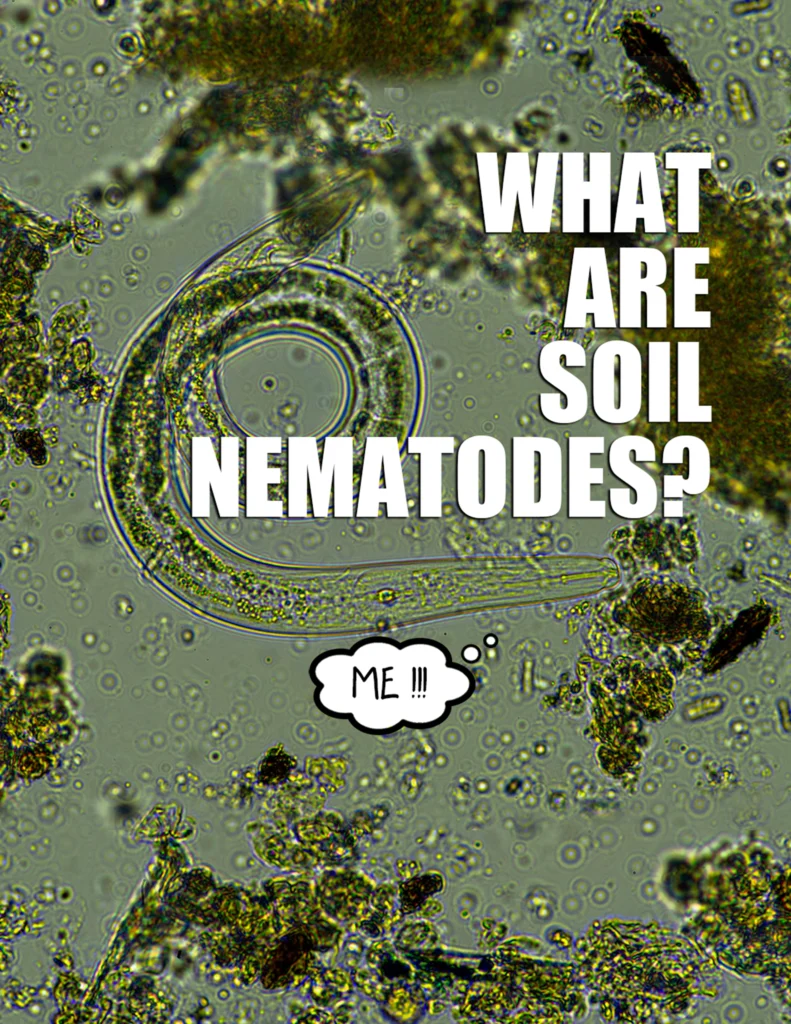What are Soil Nematodes?

Soil nematodes are microscopic, unsegmented roundworms that live in the soil. These organisms play an essential role in soil health, contributing to nutrient cycling, plant growth, and the suppression of plant pathogens. In fact, they are one of the most numerous organisms in the soil, with millions found in just one handful of dirt. Understanding soil nematodes can help farmers, gardeners, and researchers alike maintain healthy soil ecosystems.
What Are Soil Nematodes?
Soil nematodes are tiny, worm-like creatures that measure between 0.1 to 2 millimeters in length. They thrive in various environments, from deserts to oceans, but are most commonly found in soil. Nematodes are incredibly diverse, with over 20,000 species identified, many of which have critical roles in both beneficial and harmful soil activities.
Nematodes can be divided into five major groups based on their feeding habits:
- Bacterial-feeders: Consume bacteria and help recycle nutrients.
- Fungal-feeders: Consume fungi, regulating their populations in the soil.
- Predatory nematodes: Feed on other nematodes or soil organisms.
- Omnivores: Eat a variety of soil organisms and organic matter.
- Plant-parasitic nematodes: Feed on plant roots, often causing damage.
The most well-known nematodes tend to be the plant-parasitic species due to the harm they cause to crops. However, the majority of nematodes are beneficial and contribute significantly to soil health and fertility.
The Role of Soil Nematodes in Agriculture
Nutrient Cycling
Nematodes are vital contributors to the soil food web. By feeding on bacteria and fungi, they help release nutrients that plants can absorb, such as nitrogen and phosphorus. These nutrients are essential for plant growth, and nematodes help break them down in forms accessible to plants. In essence, they act as biological processors, making the soil more fertile over time.
Pest Control
Some nematodes are predators of harmful soil organisms like root-feeding insects, plant-parasitic nematodes, and harmful fungi. They naturally regulate pest populations, reducing the need for chemical interventions. This makes nematodes an important part of integrated pest management (IPM) strategies.
Soil Structure Improvement
Nematodes help maintain soil structure by promoting microbial activity. Their movement through the soil also creates microscopic channels, improving soil aeration and water infiltration. Well-structured soil is essential for the healthy growth of plants as it promotes root development and efficient nutrient absorption.
Beneficial Nematodes vs. Harmful Nematodes
While most nematodes provide benefits, not all are helpful. One of the most significant threats to agriculture comes from plant-parasitic nematodes. These harmful nematodes attack plant roots, causing damage that can lead to poor plant growth, disease susceptibility, and reduced crop yields.
Common Plant-Parasitic Nematodes
- Root-knot nematodes: These nematodes cause knots or galls to form on roots, disrupting the plant’s ability to take up water and nutrients.
- Cyst nematodes: Form cysts on plant roots, which can lead to stunted growth.
- Lesion nematodes: Burrow into roots, causing lesions that lead to secondary infections.
It’s crucial to manage harmful nematode populations while promoting beneficial ones. Practices like crop rotation, organic amendments, and using nematode-resistant plant varieties are effective in controlling parasitic nematodes without harming beneficial species.
How to Identify Soil Nematodes
Identifying nematodes in soil requires the help of a microscope, as they are not visible to the naked eye. A common method used by farmers and researchers is soil sampling, followed by laboratory analysis. This process can determine both the types of nematodes present and their population density.
Laboratory testing can help distinguish between beneficial and parasitic species, allowing for better-targeted pest management strategies. Additionally, DNA-based testing methods are becoming more common for quicker and more accurate nematode identification.
How to Manage Nematode Populations in Soil
Proper management of nematode populations is crucial to maintaining soil health. Here are some effective strategies:
- Crop Rotation: Alternating between different types of crops can help break the lifecycle of harmful nematodes.
- Organic Matter Amendments: Adding compost, manure, or other organic materials improves soil health and encourages beneficial nematode populations.
- Cover Cropping: Growing cover crops like mustard or sorghum can suppress harmful nematodes while enhancing soil structure.
- Nematode-Resistant Varieties: Planting resistant crop varieties can reduce nematode-related crop damage.
Managing nematodes doesn’t always require chemical pesticides. Biological control methods, such as introducing predatory nematodes or encouraging beneficial soil microbes, are environmentally friendly alternatives.
Impact of Soil Nematodes on Environmental Sustainability
Soil nematodes contribute to environmental sustainability by promoting biodiversity, improving soil structure, and aiding in the decomposition of organic matter. They are essential in carbon sequestration, as they help break down dead plant material and incorporate it into the soil. This process locks carbon in the soil, reducing the amount of carbon dioxide released into the atmosphere.
Furthermore, healthy nematode populations help reduce the need for chemical fertilizers and pesticides, supporting organic farming and reducing the environmental impact of agriculture.
FAQs About Soil Nematodes
Are all nematodes harmful to plants?
No, not all nematodes are harmful to plants. In fact, most nematodes are beneficial. They help in nutrient cycling, pest control, and improving soil structure. Only a small percentage of nematodes, such as root-knot and cyst nematodes, are harmful to plants by damaging their roots.
How can I control harmful nematodes in my garden?
You can control harmful nematodes by using crop rotation, applying organic matter, and planting nematode-resistant varieties. Biological controls, like introducing beneficial nematodes, can also help keep harmful populations in check.
Can nematodes be beneficial for my crops?
Yes, beneficial nematodes play a critical role in improving soil health, controlling pests, and enhancing nutrient availability. They help maintain a balanced ecosystem, promoting healthier plants and better crop yields.
If you’re looking to improve the health of your soil and boost crop production, understanding the role of soil nematodes is a crucial first step. Contact us today to learn more about soil health management and how to make your agricultural practices more sustainable.
